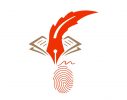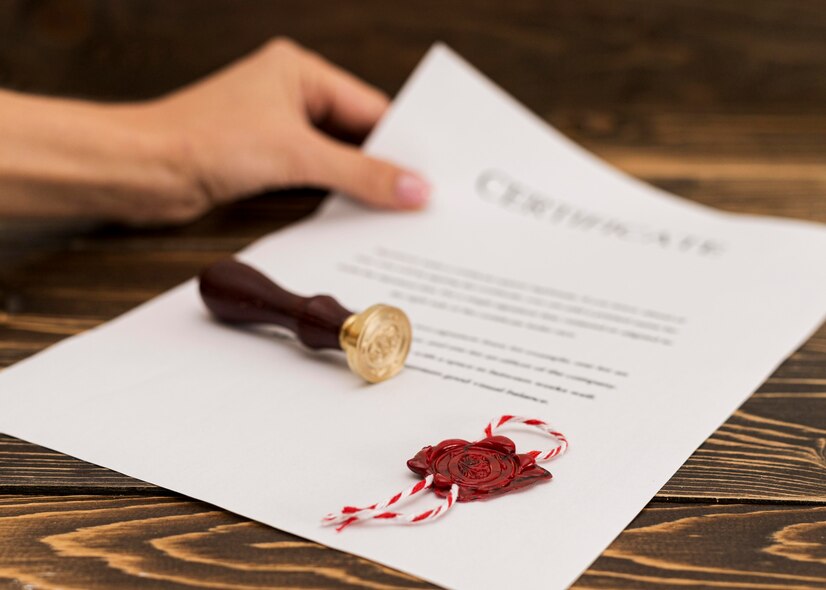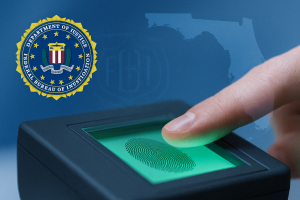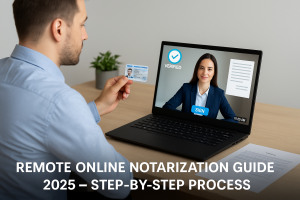A birth certificate is a very important document that proves when and where a person was born. It’s not just a record of someone’s birth, it also helps to establish who they are, where they come from, and if they have the right to live or work in a certain place. However, some birth certificates are more trustworthy than others. A professional checks and verifies a notarized birth certificate, making it even more reliable than a regular birth certificate. This is really important because it helps to make sure that people are who they say they are, especially in situations where it’s really important to know someone’s true identity.
Let’s explore the intricacies of notarizing a birth certificate and why it matters.
Why Does a Notarized Birth Certificate Matter in the US?
In the United States, a birth certificate holds significant value as it is a vital document that not only confirms one’s identity but also establishes their citizenship. Government agencies often require it when applying for passports, enrolling in schools, or seeking government benefits. However, a notarized birth certificate holds an even higher status as it bears an official seal of approval from a licensed notary public, which further verifies its authenticity.
A notarized birth certificate serves as a validated testament to one’s existence, citizenship, and legal standing. It instills confidence in the document’s authenticity, making it more reliable for official use and reducing the risk of fraud. As part of the notarization process, Notary Services Florida confirms the identity of the person presenting the birth certificate and then adds their own signature, stamp, or seal. This additional step enhances the document’s security and prevents tampering or alteration.
Overall, obtaining a notarized birth certificate is an important step in establishing one’s identity and legal standing. It offers an additional level of assurance that the document is genuine and trustworthy for official use.
What Are The Benefits Of Having Your Notarized Birth Certificate?

Consider the advantages of notarizing your birth certificate, particularly when we contemplate the purposes for why we need notaries:
Enhanced Legitimacy
A notarized birth certificate carries an added level of credibility and authenticity. Notarization involves a licensed notary public verifying the document’s legitimacy and the identity of the individual presenting it. This verification process lends weight to the birth certificate, making it more acceptable for legal transactions, official purposes, and international recognition.
Reduced Risk of Fraud
Notaries actively prevent the acceptance of fraudulent documents as real. By notarizing your birth certificate, you can reduce the risk of someone tampering with or forging it. Notaries carefully examine the birth certificate for any signs of irregularities before affixing their official seal or stamp. This extra layer of security helps to keep your personal information safe and prevent identity theft.
Global Recognition
Having a notarized birth certificate can make things a lot easier if you want to travel internationally, apply for citizenship in another country, or do business abroad. This is because many countries accept notarized documents as official and trustworthy, so you won’t have to go through as much hassle to prove your identity.
Legal Acceptance
If you’re trying to get a passport, enroll in school, get government benefits, or do any other official stuff, a notarized birth certificate might be the way to go. It’s like a real legal document that lots of people trust. Plus, it can save you time and worry about whether or not it’s legit.
How to Get a Notarized Birth Certificate

Obtaining a notarized birth certificate involves several steps to ensure the document’s legitimacy and authenticity. Here’s a detailed guide on how to get a notarized birth certificate:
Locate a Notary Public
Begin by finding a notary near you. Notaries can typically be found at banks, law offices, government buildings, or through mobile notary services. You can also search online directories or inquire about local businesses.
Gather Required Documents
Bring your original birth certificate and a valid form of identification, such as a driver’s license or passport, to the notary appointment. This ensures that the notary can verify your identity and the authenticity of the document.
Appear in Person
You’ll need to present the documents to the notary in person. They will verify your identity and witness your signature on the birth certificate. During this process, the notary may also ask you to sign a notarial journal, which records details about the transaction for their records.
Pay the Fee
Certified notary public services usually charge a fee that varies based on the transaction’s complexity and local regulations. Payment of this fee, including any applicable notary traveling fees, will be required at the time of notarization.
Receive the Notarized Certificate
Once the notary has confirmed the authenticity of the document and your identity, they will affix their official seal or stamp, completing the notarization process. The notarized birth certificate is now ready for use in various official transactions.
How Notarized Birth Certificates Establish Legitimacy
Notarized birth certificates play a crucial role in establishing legitimacy and authenticity. Here’s how the notarization process enhances the credibility of birth certificates:
- Verification of Identity: Trained notaries verify the identity of individuals presenting documents, ensuring that the person claiming the birth certificate is who they say they are, thus preventing fraud and identity theft.
- Confirmation of Authenticity: Notaries examine the birth certificate for signs of tampering or forgery, confirming its authenticity before affixing their seal. This adds an extra layer of security and ensures that the document can be trusted by third parties.
- Legal Acknowledgment: The notary’s seal serves as a legal acknowledgment of the document’s validity, adding weight to its use in official transactions and legal proceedings. This can be particularly important in cases where the birth certificate is being used as evidence in court or other legal matters.
Is it Necessary to Apostille a US Birth Certificate After Notarization?

Most of the time, you don’t need to apostille a US birth certificate after notarizing it if you intend to use the document within the United States. Notarization itself does not typically require apostille certification, as the notary public’s seal and signature serve as sufficient authentication for domestic purposes.
However, if you need to use your US birth certificate for international transactions or in countries that are party to the Hague Apostille Convention, you may need to obtain an apostille certification. The apostille certifies the authenticity of the notarized document for use in those specific countries, simplifying the process of legalizing documents across international borders.
Therefore, whether you need to apostille your US birth certificate depends on the intended use and the requirements of the country where you plan to use the document. If you’re unsure, it’s advisable to consult with certified apostille agents familiar with the specific requirements, especially in states like Florida where Apostille services are readily available. They can guide you through the process and ensure compliance with international standards, making your documents Apostille Florida-ready for international use.
Conclusion
In a world where proof of identity and citizenship is paramount, a notarized birth certificate stands as a beacon of authenticity and legitimacy. Through the diligent efforts of licensed notaries, these essential documents gain added credibility, making them invaluable assets in various legal, governmental, and personal transactions. So, whether you’re applying for a passport, enrolling in school, or embarking on international adventures, having a notarized birth certificate in your arsenal ensures that you can navigate the complexities of life with confidence and ease.
By ensuring the authenticity of your birth certificate through notarization, and if necessary, obtaining an apostille, you pave the way for smoother transactions and greater peace of mind in an increasingly interconnected world.














